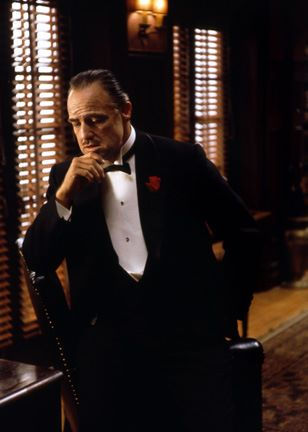The Godfather stands out from the films it inspires. I can't think of another gangster movie I like that much, and that includes The Godfather Part 2, Goodfellas, The Untouchables, and Scarface. I've never seen a single episode of The Sopranos. Criminals are not inherently sympathetic and those who take justice into their own hands (up to committing murder) can be hard to stomach. And yet this film deserves every accolade it has received, including its #2 ranking on the latest American Film Institute's list.
The reason this film works is largely due to Marlon Brando, who plays the lead as Vito Corleone. He loves his extended family and appears not to have completely lost his moral compass. He refuses a father's request to order the murder of two men who attacked his daughter. He has surely killed before but he does not believe this would be justice. He will look out for family and close friends, but he expects men to "act like a man" in return. He is always looking over his shoulder and his failing health make planning for the future more important.
His sons are not in a power struggle, but they are genuinely concerned for his welfare and the survival of the family. They include the nasty-tempered Sonny (James Caan), practical adopted son Tom Hagen (Robert Duvall), almost nonexistent Fredo (John Cazale), and recent college-graduate and Army veteran Michael (Al Pacino.) Vito has a daughter as well, Connie (Talia Shire), but she is expected to be passive and take care of future children. It's her wedding that opens the movie. There are already signs that her upcoming union will not be blissful.
There are other crime families nearby who try to coexist with the Corleones. Conflict is inevitable. When a neighboring family leans on Vito to initiate a drug trade, he politely declines. That would cross his imaginary moral line. The reaction to his refusal is violence, which is the only language that is understood. After Vito survives the first attempt on his life, Michael becomes very protective of his father and steps up his responsibilities in the family. When he realizes that the violence will not stop, he offers to eliminate the immediate threats himself. He is successful and has to disappear for a while. Since he can't explain anything to his girlfriend Kay (Diane Keaton), she eventually gives up on him.
Michael visits Sicily in the pre-Internet age, so it takes some time to locate him. He meets and eventually marries the Greek knockout Apollonia, although she falls victim to a hit on his life. Sonny also loses his life due to a betrayal as his nasty temper and big-brother instincts do him in. These scenes occur with surgical precision - it's easy to overlook that Apollonia was in the movie at all. She is never mentioned again. His later reunion with Kay in the New York feels coerced as if she doesn't have a choice. It's one of the more uncomfortable moments.
The rest of the movie involves Michael taking the reins of his crime family. Vito seems amenable to this, although he never wanted his youngest to be this involved. The families have reached an uneasy detente and a huge meeting of all the bosses supplies more questions than answers. Alliances among the families is common and Michael decides the Corleones might have better fortunes out in Las Vegas. That move doesn't go smoothly either. After Vito passes, Michael finds a way to settle all accounts on his way out of New York.
Many three-hour movies get pared down to a more manageable length, like Cinema Paradiso. I can't imagine a single scene that needs to be trimmed. The two sequels suffer from over-indulgence, but the original is three hours well spent. I once asked my class of 30 college students how many of them have seen The Godfather and 20 of them had. That is a very encouraging sign for our cinematic future.
